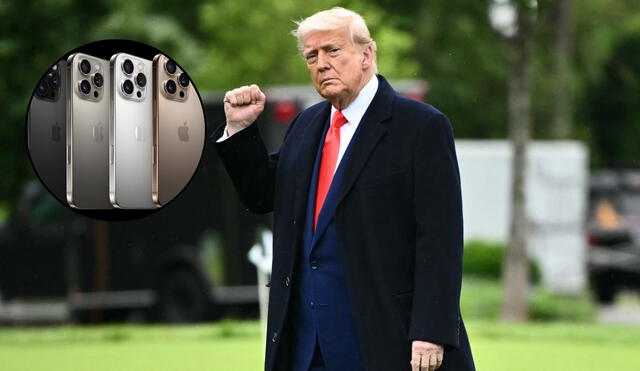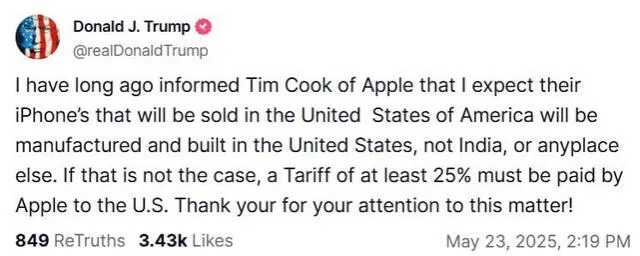Trump threatens 25% tariff on iPhones made outside the U.S.
Apple is facing a high-stakes crossroads: as Trump threatens steep tariffs on foreign-made iPhones, the tech giant could be forced to rebuild its supply chain and its future on U.S. soil. But at what cost?

U.S. President Donald Trump announced plans to enact a 25 percent tariff on all iPhones not manufactured in the United States. Trump said in a post on Truth Social that he told Apple CEO Tim Cook that any iPhones sold in the U.S. should be manufactured in the U.S. instead of in India or another country. This message is consistent with Trump's "America First" policy and his aim to grow U.S. manufacturing. Trump's message reverberated throughout the tech and global markets this week, suggesting a revival of trade tensions should Trump have a second term in office.
Trump also announced the imposition of a 50 percent tariff on all imports from the European Union (EU), establishing a deadline of June 1, 2025. Trump derided the EU for what he described as unfair trade practices and stalling negotiations. These announcements contributed to a sharp drop in the stock market, including Dow futures and Nasdaq futures. Investors reacted in fear of an escalating trade war, as well as uncertainty about the global economy. Stock volatility spiked after Trump's social media post.
Apple faces rising costs and supply chain challenges amid potential U.S. tariffs
Currently, Apple assembles its iPhones in China, and it recently expanded to India, but it does not make any smartphones in the United States, despite offering more domestic investment in the future. If Trump imposes tariffs on China, it could force Apple to reevaluate production locations, though analysts caution that it is not a fast or easy process. Apple's supply chaing is now deeply embedded in Asia. A move to the United States would require a considerable infrastructure investment.
A 25% import tax would lift Apple's costs of production to higher levels, and may pass on those costs to consumers in the form of higher prices for iPhone. Experts point out that producing iPhones in the United States would be substantially more costly and complex. Labor costs, results of deficiency of suppliers, and a lack of capacity in manufacturing are all significant barriers. Apple may face significant obstacles to maintaining its pricing and a global edge in the market.
Apple shares drop as Trump’s tariff remarks shake markets and raise investor fears
After Trump's announcement, Apple's stock price fell approximately 4%, triggering a holdback in the overall tech sector. Conversely, gold prices increased by approximately 1% as many investors sought out safer assets in the face of uncertainty. The U.S. dollar also fell slightly against many of the major global currency values. These market fluctuations appear to reflect rising investor anxiety regarding potential retraction of protectionist policies. Financial markets are anticipating economic risks in response to Trump’s remarks.

Trump warned on Truth Social that iPhones not made in the U.S. could face a 25% tariff. Photo: Donald Trump Truth Social
Trump's comments are particularly emphasized in reshoring American manufacturing and strengthening confrontational postures on trade but aggressive tariff actions are likely to harm international relationships, work against businesses, and most likely inequitable to other nations. Both global leaders and economic analysts are likely considering these actions very seriously. The tech sector, especially high-impact companies like Apple, could be greatly affected. Trade, investment, and supply chain considerations may fluctuate based on the future policies and decisions of the U.S. government.













